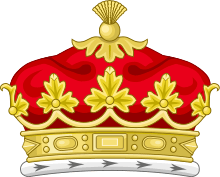Duke of Edinburgh
Duke of Edinburgh, named after the city of Edinburgh, Scotland, is a substantive title that has been created three times for members of the British royal family since 1726. The current holder is Prince Philip, husband of Queen Elizabeth II.
| Dukedom of Edinburgh | |
|---|---|
 | |
| Creation date | 20 November 1947 |
| Creation | Third |
| Monarch | George VI |
| Peerage | Peerage of the United Kingdom |
| Present holder | Prince Philip |
| Heir apparent | Charles, Prince of Wales |
| Remainder to | the 1st Duke's heirs male of the body lawfully begotten |
| Subsidiary titles | Earl of Merioneth Baron Greenwich |
| Status | Extant |
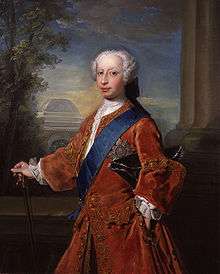
1726 creation
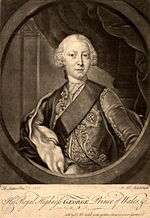
The title was first created in the Peerage of Great Britain on 26 July 1726 by King George I, who bestowed it on his grandson Prince Frederick, who also became Prince of Wales the following year. The subsidiary titles of the dukedom were Baron of Snowdon, in the County of Caernarvon, Viscount of Launceston, in the County of Cornwall, Earl of Eltham, in the County of Kent,[1] and Marquess of the Isle of Ely.[2][3][4] These titles were also in the Peerage of Great Britain. The marquessate was apparently erroneously gazetted as Marquess of the Isle of Wight[1] although Marquess of the Isle of Ely was the intended title. In later editions of the London Gazette the Duke is referred to as the Marquess of the Isle of Ely.[5][6] Upon Frederick's death, the titles were inherited by his son Prince George. When Prince George became King George III in 1760, the titles "merged into the Crown", and ceased to exist.
1866 creation
Queen Victoria re-created the title, this time in the Peerage of the United Kingdom, on 24 May 1866 for her second son Prince Alfred, instead of Duke of York, the traditional title of the second son of the Monarch. The subsidiary titles of the dukedom were Earl of Kent and Earl of Ulster, also in the Peerage of the United Kingdom.[7] When Alfred became the Duke of Saxe-Coburg and Gotha in 1893, he retained his British titles. His only son Alfred, Hereditary Prince of Saxe-Coburg and Gotha committed suicide in 1899, so the Dukedom of Edinburgh and subsidiary titles became extinct upon the elder Alfred's death in 1900.
1947 creation
The title was created for a third time on 19 November 1947 by King George VI, who bestowed it on his son-in-law Philip Mountbatten, when he married Princess Elizabeth. Subsequently, Elizabeth was styled "HRH The Princess Elizabeth, Duchess of Edinburgh" until her accession in 1952. The subsidiary titles of the dukedom are Earl of Merioneth and Baron Greenwich, of Greenwich in the County of London. Like the dukedom, these titles are also in the Peerage of the United Kingdom.[8] Earlier that year, Philip had renounced his Greek and Danish royal titles (he was born a Prince of Greece and Denmark, being a male-line grandson of King George I of Greece and male-line great-grandson of King Christian IX of Denmark) along with his rights to the Greek throne. In 1957, Philip became a Prince of the United Kingdom.[9]
Dukes of Edinburgh
First creation, 1726
| Duke | Portrait | Birth | Marriages | Death |
|---|---|---|---|---|
| Prince Frederick House of Hanover 1726–1751 also: Marquess of the Isle of Ely, Earl of Eltham, Viscount Launceston, Baron Snowdon (1726–1729); Prince of Wales (1729), Duke of Cornwall (1337), Duke of Rothesay (1398) |
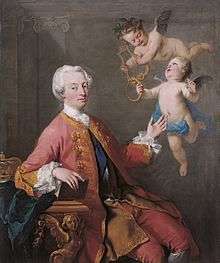 |
1 February 1707 Leineschloss, Hanover son of King George II and Queen Caroline |
Princess Augusta of Saxe-Gotha 17 April 1736 9 children |
31 March 1751 Leicester House, Leicester Square, London aged 44 |
| Prince George House of Hanover 1751–1760 also: Marquess of the Isle of Ely, Earl of Eltham, Viscount Launceston, Baron Snowdon (1751–1760); Prince of Wales (1751) |
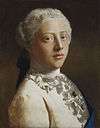 |
4 June 1738 Norfolk House, London son of Prince Frederick and Princess Augusta |
Princess Charlotte of Mecklenburg-Strelitz 8 September 1761 15 children |
29 January 1820 Windsor Castle, Windsor aged 81 |
| Prince George succeeded as George III in 1760 upon his grandfather's death, and his titles merged with the crown. | ||||
Second creation, 1866
| Duke | Portrait | Birth | Marriages | Death |
|---|---|---|---|---|
| Prince Alfred House of Saxe-Coburg and Gotha 1866–1900 also: Earl of Kent and Earl of Ulster (1866) |
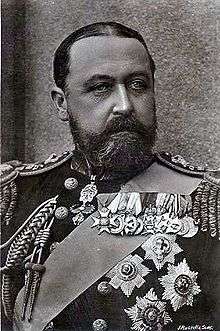 |
6 August 1844 Windsor Castle, Windsor son of Queen Victoria and Prince Albert |
Grand Duchess Maria Alexandrovna of Russia 23 January 1874 6 children |
30 July 1900 Schloss Rosenau, Coburg aged 55 |
| Prince Alfred and Grand Duchess Maria had one son, who predeceased him; and all his titles became extinct on his death. | ||||
Third creation, 1947
| Duke | Portrait | Birth | Marriages | Death |
|---|---|---|---|---|
| Prince Philip House of Glücksburg 1947–present also: Earl of Merioneth and Baron Greenwich (1947) |
 |
10 June 1921 Mon Repos, Corfu son of Prince Andrew of Greece and Denmark and Princess Alice of Battenberg |
Queen Elizabeth II 20 November 1947 4 children |
– now 99 years, 64 days old |
Possible future creations
It was announced in 1999, at the time of the wedding of Prince Edward, Earl of Wessex, that he would follow his father as Duke of Edinburgh. This is unlikely to happen by direct inheritance, as Prince Edward is the youngest of Prince Philip's three sons. Rather, the title is expected to be newly created for Prince Edward after it "eventually reverts to the crown"[10] after "both the death of the current Duke of Edinburgh and the Prince of Wales' succession as King."[11]
Line of succession
Although the following individuals are in the line of succession to the Dukedom, they are also in line of succession to the throne. As a consequence, should one of the following individuals become king while Duke, the Dukedom of Edinburgh would cease to exist, as it would merge with the Crown.
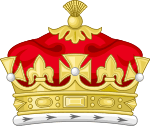
- (1)
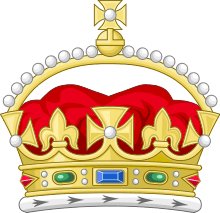
- (2)
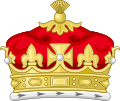
- (3) Prince George of Cambridge (b. 2013)
- (4) Prince Louis of Cambridge (b. 2018)
- (5)

- (6) Archie Mountbatten-Windsor (b. 2019)
- (2)
- (7)

- (8)

- (9)
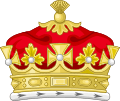
- (9)
- (1)
Family tree
Fictional Duke of Edinburgh
A fictional Duke of Edinburgh appears in the 1980s sitcom The Black Adder. Rowan Atkinson plays the title character, Prince Edmund, who is granted the title Duke of Edinburgh by his father, a fictitious King Richard IV.
See also
References
- "No. 6494". The London Gazette. 12 July 1726. p. 1.
- "Frederick Louis Hanover, Prince of Wales". Thepeerage.com. Retrieved 25 August 2014.
- "Peerages: Eames to Emly". Leighrayment.com. Retrieved 25 August 2014.
- "Archived copy". Archived from the original on 20 April 2013. Retrieved 13 July 2012.CS1 maint: archived copy as title (link)
- "No. 6741". The London Gazette. 4 January 1728. p. 2.
- "No. 9050". The London Gazette. 16 April 1751. p. 1.
- "No. 23119". The London Gazette. 25 May 1866. p. 3127.
- "No. 38128". The London Gazette. 21 November 1947. p. 5496.
- "No. 41009". The London Gazette. 22 February 1957. p. 1209.
- "The Earl of Wessex". Royal.gov.uk. Archived from the original on 3 December 2010. Retrieved 30 October 2010.
- Whitaker's Almanack 2010, page 46 'Peers of the Blood Royal'
